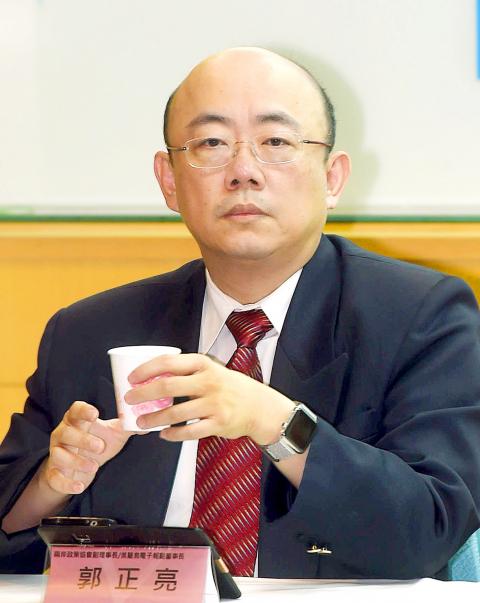Former Democratic Progressive Party (DPP) legislator Julian Kuo (郭正亮), who is to return to the Legislative Yuan as an at-large lawmaker, yesterday denied allegations that he is pro-China, saying that his cross-strait stance is “almost the same” as the DPP’s.
Kuo has been named to replace DPP Legislator Wellington Koo (顧立雄), who has been appointed to head the Committee of Illegal Party Asset Settlement that was mandated by the Act Governing the Handling of Illegal Properties by Political Parties and Their Affiliate Organizations (政黨及其附隨組織不當取得財產處理條例), which took effect yesterday.
In a radio interview yesterday, Kuo said that his position on cross-strait relations is more or less the same as that of President Tsai Ing-wen (蔡英文) and not much different from the DPP’s general position.

Photo: Fang Pin-chao, Taipei Times
He said that he has never supported the so-called “1992 consensus,” a term created by then-Mainland Affairs Council chairman Su Chi (蘇起) in 2000 to refer to a tacit understanding of “one China,” with China and Taiwan each having its own interpretation of what “China” means.
It will be exceedingly hard to cross the current impasse in cross-strait relations before the Chinese Communist Party’s 19th National Congress — which is scheduled for November next year, he said.
Criticism that he is “green on the outside and blue on the inside” or “China-leaning and opposed to Taiwanese independence” are “rubbish,” he said.
His disagreements with government are not meant to target Tsai or Premier Lin Chuan (林全), it is just that he questions whether government policy is too pro-US, he said.
“The DPP is a free and democratic party that tolerates the discussion of different ideas, but when the party’s Central Committee makes a resolute decision, it must be respected. After I return to the Legislative Yuan, I will have the opportunity to communicate directly with Legislative Speaker Su Jia-chyuan (蘇嘉全) and DPP caucus whip Ker Chien-ming (柯建銘),” he said.
Tsai and Lin are not opposed to the promotion of trade in goods with China, but they cannot use the so-called “1992 consensus” as the prerequisite for doing so, Kuo said.
Trade in goods across the Taiwan Strait is normally negotiated through the Economic Cooperation Framework Agreement (ECFA), for which Kuo used to act as the DPP’s spokesman on the issue.
“When all is said and done, Taiwanese businesses cannot omit the Chinese market,” Kuo said.
Kuo has also come under criticism for a drunk-driving offense in February.
He took full responsibility for the incident and would not make the same mistake again, he said, adding that if he were to re-offend, he would resign.

Chinese Nationalist Party (KMT) Chairman Eric Chu (朱立倫), spokeswoman Yang Chih-yu (楊智伃) and Legislator Hsieh Lung-chieh (謝龍介) would be summoned by police for questioning for leading an illegal assembly on Thursday evening last week, Minister of the Interior Liu Shyh-fang (劉世芳) said today. The three KMT officials led an assembly outside the Taipei City Prosecutors’ Office, a restricted area where public assembly is not allowed, protesting the questioning of several KMT staff and searches of KMT headquarters and offices in a recall petition forgery case. Chu, Yang and Hsieh are all suspected of contravening the Assembly and Parade Act (集會遊行法) by holding

PRAISE: Japanese visitor Takashi Kubota said the Taiwanese temple architecture images showcased in the AI Art Gallery were the most impressive displays he saw Taiwan does not have an official pavilion at the World Expo in Osaka, Japan, because of its diplomatic predicament, but the government-backed Tech World pavilion is drawing interest with its unique recreations of works by Taiwanese artists. The pavilion features an artificial intelligence (AI)-based art gallery showcasing works of famous Taiwanese artists from the Japanese colonial period using innovative technologies. Among its main simulated displays are Eastern gouache paintings by Chen Chin (陳進), Lin Yu-shan (林玉山) and Kuo Hsueh-hu (郭雪湖), who were the three young Taiwanese painters selected for the East Asian Painting exhibition in 1927. Gouache is a water-based

Taiwan would welcome the return of Honduras as a diplomatic ally if its next president decides to make such a move, Minister of Foreign Affairs Lin Chia-lung (林佳龍) said yesterday. “Of course, we would welcome Honduras if they want to restore diplomatic ties with Taiwan after their elections,” Lin said at a meeting of the legislature’s Foreign Affairs and National Defense Committee, when asked to comment on statements made by two of the three Honduran presidential candidates during the presidential campaign in the Central American country. Taiwan is paying close attention to the region as a whole in the wake of a

OFF-TARGET: More than 30,000 participants were expected to take part in the Games next month, but only 6,550 foreign and 19,400 Taiwanese athletes have registered Taipei city councilors yesterday blasted the organizers of next month’s World Masters Games over sudden timetable and venue changes, which they said have caused thousands of participants to back out of the international sporting event, among other organizational issues. They also cited visa delays and political interference by China as reasons many foreign athletes are requesting refunds for the event, to be held from May 17 to 30. Jointly organized by the Taipei and New Taipei City governments, the games have been rocked by numerous controversies since preparations began in 2020. Taipei City Councilor Lin Yen-feng (林延鳳) said yesterday that new measures by